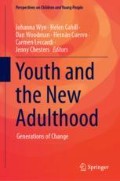Abstract
In this chapter we explore notions of temporality, subjectivity and agency in our analysis of the ways in which young adults make sense of the way social and economic shifts play out in their personal, professional and family lives. We call on data from a dialogic workshop conducted in 2018 to examine the ways participants cope with the disrupted nexus between education and work. We find that the widespread experience of precarious work required new ways of thinking about the present in relation to the future, a distinguishing feature of the new adulthood. Temporality was a key motif within conversations about the difficulty of making a secure life for themselves and their children. The work to make sense of fractured life course storylines was further aggravated by performativity pressures generated via engagement with social media. A labour of comparison infiltrated everyday life. The mismatch between past expectations, present realities and unpredictable futures produced feelings of anxiety, and a sense of being wronged by history. The tension between uncertain personal futures, and looming climate futures produced an abrasive powerlessness, dealt with by attention to performing well in the present. A new form of agency was required to deal with the accompanying existential challenge. To craft an intelligible life, the subject must make meaning adhere despite a disrupted logic of progression through time. In this effort resilience may be re-framed as the ability to make daily and future time meaningful without reliance on traditional discourses and timelines, and the willingness to accept contradictions and ambiguities as opportunities for emergence. Agency might then also be reconceptualised as the exertion of poise and versatility in the face of emerging circumstances. Resilience may be re-framed as an aesthetics of life-making in the everyday, requiring the employment of those micro-strategies which help one to live with the present despite an uncertain future.
Access this chapter
Tax calculation will be finalised at checkout
Purchases are for personal use only
References
Colombo, E., & Rebughini, P. (Eds.). (2019). Youth and the politics of present: Coping with complexity and ambivalence. London and New York: Routledge.
Cuzzocrea, V. (2019). ‘Flexi-lives’: Facing the mobility imperative. In E. Colombo & P. Rebughini (Eds.), Youth and the politics of present: Coping with complexity and ambivalence (pp. 44–55). London and New York: Routledge.
De Certeau, M. (1984). The practice of everyday life. Berkeley: University of California Press.
Dunn Cavelty, M., Kaufmann, M., & Søby Kristensen, K. (2015). Resilience and (in) security: Practices, subjects, temporalities. Security Dialogue, 46(1), 3–14.
Estevão, P., Calado, A., & Capucha, L. S. (2017). Resilience: Moving from a “heroic” notion to a sociological concept. Sociologia, Problemas e Práticas, 85, 25–99. https://doi.org/10.7458/SPP20178510115.
Foucault, M. (1988). Technologies of the self: A seminar with Michel Foucault (pp. 16–49). Massachusetts: The University of Massachusetts Press.
Gergen, K. (2001). The saturated self: Dilemmas of identity in contemporary life. New York: Basic Books.
Giddens, A. (1991). Modernity and self-identity: Self and society in the late modern age. Cambridge: Polity.
Giorza, E. (2017). Dalla metis alla resilienza: proposte di resistenza nel mondo del ‘tutto scorre’. Micromega online, 13 ottobre 2017.
Joseph, J. (2013). Resilience as embedded neoliberalism: A governmentality approach. Resilience, 1(1), 38–52. https://doi.org/10.1080/21693293.2013.765741.
Keck, M., & Sakdapolrak, P. (2013). What is social resilience? Lessons learned and ways forward. Erdkunde, 17(1), 5–19.
Leccardi, C. (2017). The recession, young people, and their relationship with the future. In I. Schoon & J. Bynner (Eds.), Young people’s development and the great recession: Uncertain transitions and precarious futures (pp. 348–371). Cambridge: Cambridge University Press.
Rosa, H. (2010). Alienation and acceleration: Towards a critical theory of late-modern temporality. Aarhus: Aarhus University Press.
Rosa, H. (2013). Social acceleration: A new theory of modernity. New York: Columbia University Press.
Simmel, G. (1968). The conflict in modern culture and other essays. New York: Teachers College Press.
Sloterdijk, P. (1996). Essai d’intoxication volontaire: Conversation avec Carlos Oliveira. Paris: Calman-Levy.
Author information
Authors and Affiliations
Corresponding author
Editor information
Editors and Affiliations
Rights and permissions
Copyright information
© 2020 Springer Nature Singapore Pte Ltd.
About this chapter
Cite this chapter
Cahill, H., Leccardi, C. (2020). Reframing Resilience. In: Wyn, J., Cahill, H., Woodman, D., Cuervo, H., Leccardi, C., Chesters, J. (eds) Youth and the New Adulthood. Perspectives on Children and Young People, vol 8. Springer, Singapore. https://doi.org/10.1007/978-981-15-3365-5_5
Download citation
DOI: https://doi.org/10.1007/978-981-15-3365-5_5
Published:
Publisher Name: Springer, Singapore
Print ISBN: 978-981-15-3364-8
Online ISBN: 978-981-15-3365-5
eBook Packages: Social SciencesSocial Sciences (R0)

